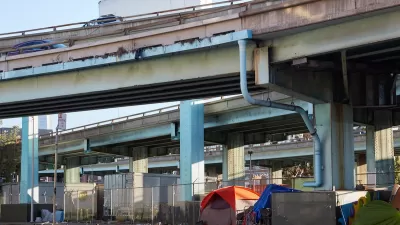An analysis from Denver shows that unhoused people receiving services based on a Housing First approach were more likely to access psychiatric care and had fewer emergency medical visits.

An analysis of supportive housing programs in Denver, Colorado reveals that a Housing First approach, which prioritizes placing unhoused people into housing before imposing other requirements, led to higher rates of doctor visits for mental health diagnoses and prescriptions and lower numbers of emergency room visits among participants.
An article by researchers Devlin Hanson and Sarah Gillespie in Health Affairs outlines part of their results. “Two years after assignment to the Housing First intervention, participants had an average of eight more office-based visits for psychiatric diagnoses, three more prescription medications, and six fewer emergency department visits than the control group.” The two groups had no statistically significant difference in mortality rates.
The authors see these results as an indicator that housing programs can also impact health care provision. “As policy makers seek increased funding to scale up effective ways to address the needs of populations experiencing chronic homelessness, our results provide evidence that supportive housing with a Housing First approach not only can provide a housing solution but also can facilitate engagement in needed health care services.”
FULL STORY: ‘Housing First’ Increased Psychiatric Care Office Visits And Prescriptions While Reducing Emergency Visits

Planetizen Federal Action Tracker
A weekly monitor of how Trump’s orders and actions are impacting planners and planning in America.

Maui's Vacation Rental Debate Turns Ugly
Verbal attacks, misinformation campaigns and fistfights plague a high-stakes debate to convert thousands of vacation rentals into long-term housing.

San Francisco Suspends Traffic Calming Amidst Record Deaths
Citing “a challenging fiscal landscape,” the city will cease the program on the heels of 42 traffic deaths, including 24 pedestrians.

Defunct Pittsburgh Power Plant to Become Residential Tower
A decommissioned steam heat plant will be redeveloped into almost 100 affordable housing units.

Trump Prompts Restructuring of Transportation Research Board in “Unprecedented Overreach”
The TRB has eliminated more than half of its committees including those focused on climate, equity, and cities.

Amtrak Rolls Out New Orleans to Alabama “Mardi Gras” Train
The new service will operate morning and evening departures between Mobile and New Orleans.
Urban Design for Planners 1: Software Tools
This six-course series explores essential urban design concepts using open source software and equips planners with the tools they need to participate fully in the urban design process.
Planning for Universal Design
Learn the tools for implementing Universal Design in planning regulations.
Heyer Gruel & Associates PA
JM Goldson LLC
Custer County Colorado
City of Camden Redevelopment Agency
City of Astoria
Transportation Research & Education Center (TREC) at Portland State University
Jefferson Parish Government
Camden Redevelopment Agency
City of Claremont





























